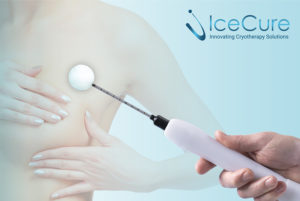
A pilot study, published in the Journal of Cancer Therapy, reveals that percutaneous cryoablation of early-stage, low-risk breast cancer tumours smaller than 15mm presents a potential substitute for lumpectomy.
Investigators, Hinsanoro Kawamoto (Department of Breast Surgery, Breast and Imaging Center, StMarianna) and colleagues report “encouraging short- to mid-term oncology results with good cosmesis outcomes” for the procedure.
They highlight that patients would be able to benefit from local anaesthesia in an outpatient setting and a shorter recovery period.
The pilot study enrolled eight patients and set out to evaluate the feasibility, safety, and cosmetic outcomes of percutaneous cryoablation of breast intraductal carcinoma lesions, as well as post-cryoablation magnetic resonance imaging (MRI) as a follow-up tool for detection of residual malignancies and local recurrences.
“We are excited to see the publication of these data from an independent study which further supports the use of our ProSense cryoablation system to eliminate small malignant lesions in the breast instead of performing breast surgery under general anaesthesia,” commented Eyal Shamir, chief executive officer of IceCure.
A press release from the company states: “The independent study conducted at the St Marianna University Breast and Imaging Center enrolled eight women, 53–72 years of age. Percutaneous ultrasound-guided cryoablation of the breast tumour was performed using IceCure’s ProSense, under local anaesthesia without the need for subsequent resection. The procedure lasted for 40 minutes on average. All patients received radiation and endocrine therapies. The patients were followed using vacuum-assisted biopsy (VAB), mammography (MG), MRI, and Moiré Topography for cosmetic outcomes.”
In September 2021, IceCure announced an Annals of Surgical Oncology publication authored by Richard Fine (West Comprehensive Breast Center, Germantown, USA) and colleagues. The article reported results previously announced at the American Society of Breast Surgeons Annual Meeting, that at a mean of 34.83 months following treatment with the ProSense cryoablation system, only 2.06% (four of 194 patients) experienced cancer recurrence.
The ICE3 trial commenced in 2014 and was conducted at 19 US hospitals, including Columbia University Medical Center and Mount Sinai Beth, Isarel. The trial enrolled and treated 194 patients (average age of 75) with low-risk, early-stage breast cancer tumours measuring up to 1.5cm.
Fine and colleagues conclude: “Breast cryoablation presents a promising alternative to surgery while offering the benefits of a minimally-invasive procedure with minimal risks.” Fine stated that “the three-year ICE3 trial results highlighting the efficacy and safety of the procedure in this patient group are extremely promising for breast cryoablation. Being able to provide a minimally-invasive option for treating appropriate low-risk patients represents a dramatic improvement in care. The procedure is quick, painless and can be delivered with local anaesthesia in doctors’ offices, with minimal recovery time and excellent cosmetic outcomes.”












